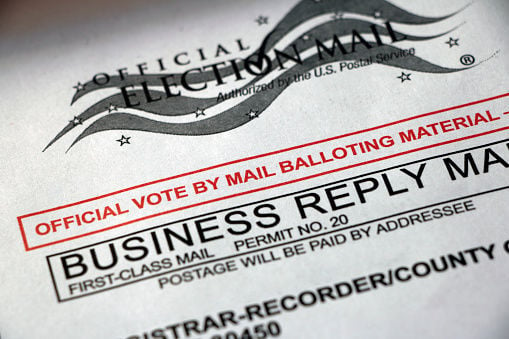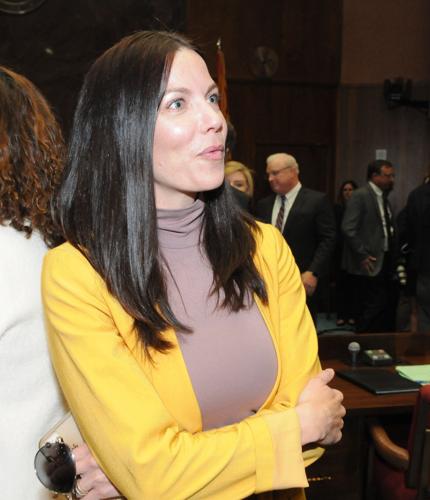PHOENIX — Lawmakers are one step away from removing the concept of “permanent” from the state’s permanent early voting list.
With Republicans in favor and Democrats opposed, a House committee approved a measure Wednesday that would require counties to stop sending out an early ballot to anyone who has not used early voting in either of the last two statewide or federal elections.
The proposal by Sen. Michelle Ugenti-Rita, R-Scottsdale, would require county recorders to send a notice to people informing them of their pending removal from the list. Then, if the voter responded, he or she would remain on the list and continue to get ballots in the mail.
The measure, Senate Bill 1485, already was approved by the Senate and now awaits a House vote after Wednesday’s OK by the Committee on Government and Elections.
Rep. Bret Roberts, R-Maricopa, called it a “housekeeping” measure that would save money by not having early ballots mailed out to those who are not using them.
But Rep. Athena Salman, D-Tempe, said the bill is another attempt to make voting more difficult. Evidence shows it would more likely affect minorities, she said.
A lack of rain in late 2020 may mean a disappointing wildflower season. Let us fill in the gap with this compilation of wildflower videos from former Arizona Daily Star reporter Doug Kreutz.
Rep. Raquel Teran, D-Phoenix, said data from the 2020 election shows there were about 126,000 people who cast a ballot in that record-breaking year but had not, for whatever reason, used their early ballots in 2016 or 2018.
And Salman said that, given the propensity of minority votes to skew Democratic, eliminating those votes would have allowed Donald Trump to win in Arizona.
Sandy Bahr, chapter director of the Sierra Club, also suggested a direct link between the 2020 election and motives behind the bill. “Is it because more and more Arizonans are using early ballots to vote?” she asked. About 80% of Arizonans voted early in November.
“Or is it because the election results were different than certain people would have liked?” Bahr asked.
Rep. Jake Hoffman, R-Queen Creek, rejected the idea of a “grand conspiracy” to make it harder for minorities to vote.
“This is an administrative cleanup” to remove people who don’t vote early from the mailing list “so that our taxpayers and so that our counties aren’t burdened with sending ballots over and over and over and over and over,” he said.
Backers have another argument, as well.
“This will reduce the opportunity for ballots to be sent out to people who are no longer voting,” ballots that may then be picked up by someone else and voted, Ugenti-Rita said.
Rep. John Kavanagh, R-Fountain Hills, said the only check now on validity of early ballots is a comparison of signatures on the envelope by county election workers with those on file. He said it would be easy for someone to get another person’s signature, perhaps off of publicly filed documents, and simply trace it.
Salman, the Tempe Democrat, scoffed at the suggestion. “There has been no credible evidence to prove that that has been the case,” she said.
But Rep. Kevin Payne, R-Peoria, cited a case in which a Tennessee man said he had moved from Arizona yet an early ballot was mailed to his former home. It turned out that ballot was voted.
Payne said that’s one situation that did become public, questioning how much more often that occurs. “Voter fraud does happen, even if we don’t see it,” Payne said.
This is one of a series of Republican-sponsored bills this year to put new restrictions on voting, all in the wake of the presidential election results. Some would create additional hurdles in the early voting process, including requiring identification when ballots are mailed and shortening the amount of time people have to consider and return their early ballots.
Salman said there are good reasons for suspicions of sinister motives by Republicans and said SB 1485 should be seen as a “voter suppression bill.”
She pointed to arguments made a week ago at the U.S. Supreme Court by Michael Carvin, an attorney for the Arizona Republican Party. He is defending a 2016 law that makes it a crime for anyone to take someone else’s early ballot to the polls in situations where the voter forgets to get it in the mail on time to arrive before 7 p.m. Election Day.
Asked why the GOP is a party in the case, Carvin said early voting “puts us at a competitive disadvantage relative to Democrats.”
Ugenti-Rita said foes are making too much of the proposed change. She said that, in order to be dropped from the mailing, someone would have had to fail to cast an early ballot in any of four elections in the prior two years, meaning the primary and general elections.
Anyway, she said, people dropped from the early voting list would not be disenfranchised, as it would not cancel their registration. They could still go to the polls to cast a ballot in person. They could also sign up again to be placed on the early voter list, she said.
There also were arguments over the cost of the plan.
Bonnie Boice-Wilson of the League of Women Voters figured that implementing it would cost more than $800,000 a year, much of that in mailing the notices to people who did not use their early ballots to ask them if they want to continue to get them by mail.
But Rep. Frank Carroll, R-Sun City West, said that would be offset by what counties save in not sending early ballots to people who don’t use them or are no longer there.
Photos of famous musicians who have jammed out in Tucson

Ron Wood, Mick Jagger and Keith Richards with the Rolling Stones perform at the Tucson Community Center July 21, 1978.

The "Piano Man" Billy Joel performs at the Tucson Community Center on November 14, 1978.

Rocker Elton John shows some of his moves at the Tucson Community Center Arena on October 1, 1975.

August 27, 1977: Somewhere under all those people is the football field at Arizona Stadium during the Fleetwood Mac concert.

Brad Palmer, left, and Dewey Bunnell of America played at Centennial Hall Oct. 21, 1987.

Bruce Johnston, Carl Wilson and Al Jardine in forefront of a song. The Beach Boys played at Hi Corbet field May 4, 1985.

Brian Wilson, Al Jardine and Mike Love do their stuff on stage at the University of Arizona's McKale Center April 24, 1978.

Mike D. of the Beastie Boys thrilled the audience of 2,430 at Sunday's Concert. They played the Tucson Convention Center's old Exhibition Hall Oct. 25, 1992.

Joe Elliott led Def Leppard through an energetic show. Def Leppard played at the Tucson Convention Center Dec. 26, 1992.

Def Leppard's Steve Clark jams at the TCC. The group played the Tucson Convention Center Nov. 18, 1987.

Joe Walsh, Randy Meisner, Don Henley, Glenn Frey and Don Felder, of the Eagles played at the University of Arizona McKale Center Oct. 16, 1976.

Kenneth E. Carter performs with the Guess Who at the Tucson Community Center Aug. 10, 1986.

K.K. Downing, lead guitarist of Judas Priest plays at the Tucson Community Center Arena June 9, 1980.

The Judds performed at the Tucson Convention Center March 7, 1991.

James "J.T." Taylor and Kool and the Gang performed at the Tucson Community Center May 10, 1987.

The Platters let to right, Bernette Murphy, Ricky Lane, Dexter Dickerson and Bill Williams performed at the Doubletree Inn March 18, 1977.

Peter, Paul and Mary performed at the University of Arizona Main Auditorium April 30, 1983.

Carlos Santana jams during a performance at the Pima County Fairgrounds Sept. 1, 1991.

The stage is set for The Who at Sun Devil Stadium Oct. 31, 1982. No, the concert wasn't in Tucson, but we included them anyway.

The Who: John Entwistle, Roger Daltrey, Pete Townshend, Tim Gorman (a touring member) and Kenney Jones perform at Sun Devil Stadium Oct. 31, 1982. No, the concert wasn't in Tucson, but we included them anyway.

Dwight Yoakam performed at the Tucson Convention Center June 16, 1993.

Dwight Yoakam performed at the Tucson Convention Center Sept. 20, 1989.

Neil Young performed at the Tucson Convention Center Nov. 13, 1986.

ZZ Top in concert at the University of Arizona McKale Center Aug. 12, 1991.

ZZ Top in concert at the University of Arizona McKale Center Aug. 12, 1991.

Diana Ross at McKale Center October 3, 1983. Photo by Joy Wolf / Arizona Daily Star

David Bowie in concert at the Tucson Community Center on Sept. 13, 1974. The TCC was set up for 9,500, but only sold tickets to 4,032 fans.






